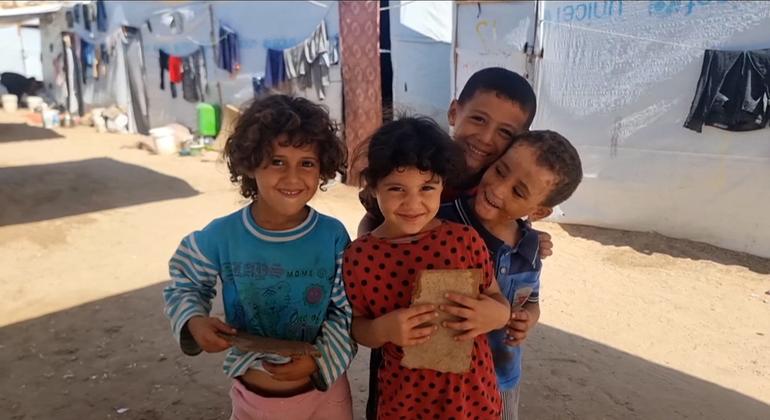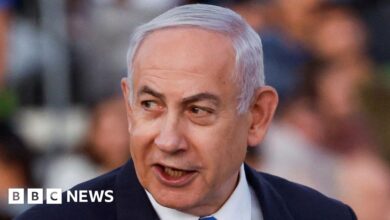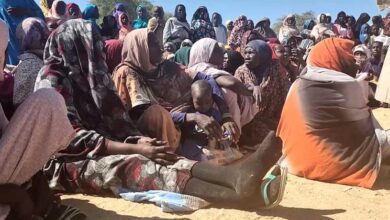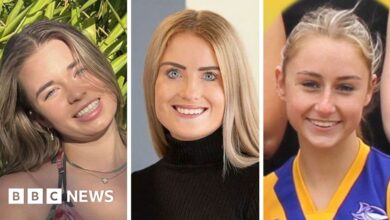‘Orphan City’ helps children in Gaza as war continues

According to the Palestinian Health Ministry, the latest death toll surpassed more than 41,000 people – the majority of them women and children – while much of Gaza’s population of 2.3 million has been forcibly displaced and stuck in just 10% of the territory. but in this grim situation, new initiatives aim to shine even the smallest ray of light amid the darkness of war.
In the Al-Mawasi area, west of Khan Younis, teacher Mahmoud Kallakh set up a camp to provide relief to families who had lost their man and breadwinner.
Al-Baraka Orphanage is currently hosting 400 displaced Palestinian families in this area of southern Gaza. In an interview with our correspondent in Gaza, Ziad Taleb, Mr. Kallakh said that the initiative aims to provide care for families in what he described as “an orphanage city ”, including shelter, food and drink, medical care along with educational and social services, with help, including from the United Nations Children’s Fund (UNICEF).
“We have a dedicated health center and a school funded by the United Nations, through UNICEF, which fortunately provides the necessary resources for the school, supports the students, provides provide stationery for the children and pay salaries for the teachers.” “We want to completely establish this school, to replace these small tents, to create a more comfortable environment for students to study.”

Taleen Al-Hinnawi lost her father due to the war in Gaza and now lives at Al-Baraka orphanage.
More than 17,000 orphans in Gaza
The number of children served here is just a drop in the sea of orphans in Gaza in need of protection. The number of unprotected orphans in Gaza currently ranges from 17,000 to 18,000, many of whom are unaccompanied by family members.
Taleen Al-Hinnawi lost her father due to war and is trying to adapt to her new life in the Al-Baraka orphanage. Signs of shock and sadness were evident on her face as she spoke to UN NewsTell us about her father.
“Baba [Arabic for dad] very emotional,” she said. “I don’t feel like Baba was martyred.”
The young girl’s perspective on life has completely changed.
The war, she said, is trying to “wipe out entire families.”
Taleen said she looks forward to returning to her home in Gaza City “so life can return to normal, studying like everyone else and memorizing the Quran like everyone else. Before that, we lived in our own house. We never bothered anyone and we always kept it a secret.”

Nada Al-Gharib lost her father and only brother in an attack on the family tent, which also injured her and her mother.
‘We lost them’
“This war took away my father and my only brother.”
With these words, young girl Nada Al-Gharib began to tell her story. She and her mother were also injured in the attack on the tent where the family was sheltering in Khan Younis. They were trapped inside for three days.
Nada said her family had to relocate from northern Gaza to Khan Younis “because that’s what the profession required of us”.
“We came here and we were stuck. My father and my only brother were martyred, and my mother and I were injured,” she explained.

A large crater caused by an Israeli airstrike hit a makeshift camp for displaced people in Al-Mawasi, west of Khan Younis in Gaza.
‘Here we are like siblings’
After leaving the tent, Nada and her mother went to the industrial area west of Khan Younis, where they received treatment and became trapped again. They passed through Israeli checkpoints as they crossed Rafah, where they also fled, and eventually reached the Al-Baraka orphanage, she recalled.
She and her mother found a second home in this camp, she said, “because everyone around us had the same story and pain.”
“We are like siblings here,” she said. “All mothers are like our mothers, and all children are our brothers and sisters. We love each other here so much. We love our lives. Despite difficulties and losses [of our loved ones] When things are difficult for us, we try to live for them.”
Nada said her father was a kind man who loved his family very much.
“He would never let us do anything difficult,” she said. “Now things are difficult. We had to go get water and do things that men should have done, but we had no choice because we lost them.”

As the war continues in Gaza, mass displacement is having a devastating impact on women and girls.
Increased hostility
UNICEF said the escalation of conflict in the Gaza Strip is seriously affecting children and their families, causing children to die at an alarming rate. According to estimates by the Palestinian Ministry of Health, more than 14,000 children were killed and thousands more were injured.
An estimated 1.9 million people – about nine out of every 10 Gazans – have been internally displaced, more than half of whom are children, without adequate water, food, fuel and medicine.
The United Nations agency is calling for an immediate and lasting humanitarian ceasefire, and rapid, safe and unhindered humanitarian access for all children and families in need in Gaza, including in the Northern Strip, the immediate, safe and unconditional release of all abducted children and an end to any serious violations against children, including killing and maiming injury.




